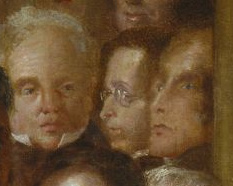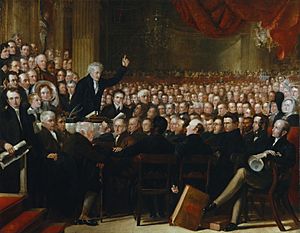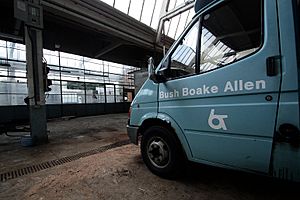Stafford Allen facts for kids
Quick facts for kids
Stafford Allen
|
|
|---|---|

Abraham Beaumont, Stafford Allen and William Beaumont at the World Anti-Slavery Convention
|
|
| Born | 1806 Witham, Essex, England
|
| Died | 14 October 1889 (aged 82–83) Upper Clapton, England
|
| Nationality | British |
| Occupation | industrialist |
| Known for | Abolitionist and philanthropist |
| Spouse(s) | Hannah Hunton (born Ransome) |
Stafford Allen (1806 – 14 October 1889) was an important British businessman who cared deeply about helping others. He was a Quaker, which is a type of Christian faith that believes in peace and equality. Stafford Allen worked to end slavery (he was an abolitionist) and gave money to many good causes (he was a philanthropist). He also started his own successful company, Stafford Allen and Sons. Later in his life, he became a Vice-President of the British and Foreign Anti-Slavery Society because of his long support.
Contents
Stafford Allen's Life Story
Early Life and Family
Stafford Allen was born in 1806 in a place called Witham, Essex, England. His parents, Phebe and Samuel Allen, were both Quakers.
In 1839, Stafford Allen married Hannah Hunton Ransome. Her father was James Ransome, a well-known manufacturer from Ipswich. Stafford and Hannah had a large family together.
Starting a Business
In 1833, Stafford Allen started his own pharmacy company. It was called Stafford Allen and Sons. This company became very successful and made a lot of money.
His company made many different products. They were especially good at making things from Cedar wood and cloves. Stafford Allen also owned an iron foundry, but his main focus was always his pharmacy business. His brother George and another partner, George May, helped him with his early business ventures.
Fighting Against Slavery
Stafford Allen was a strong supporter of ending slavery. In 1840, he went to the World Anti-Slavery Convention in London. This big meeting was organized by Joseph Sturge and the British and Foreign Anti-Slavery Society. Stafford Allen was one of the main supporters of this group.
When a famous painting was made to remember the convention, Stafford Allen was included. This showed how important he was to the anti-slavery movement.
Helping Freed Slaves
Even after slavery ended, Stafford Allen continued to help people who had been enslaved. After the American Civil War, he visited the United States. He wanted to see how freed people were living there.
Around the same time, Harriet Jacobs visited Britain. She was a former slave and an activist. She came to raise money for orphans and poor freed people in Savannah, Georgia. Harriet Jacobs asked people to send their donations to Stafford Allen, among others.
Helping During War
Stafford Allen was also involved in helping people during the Franco-Prussian War in 1870. He was part of a Quaker committee that worked to reduce suffering. His company even donated medicines to help those affected by the war. In the same year, he traveled to Egypt and Palestine.
Later Years
Stafford Allen's wife, Hannah, passed away in 1880. He continued his work, and after supporting the British and Foreign Anti-Slavery Society for fifty years, he was made a Vice-President.
Stafford Allen died in October 1889 in Upper Clapton, England.
Stafford Allen's Legacy
The company Stafford Allen started, Stafford Allen and Sons, grew and changed over time. It later became part of a company called Bush, Broake Allen. In 2000, this company was bought by International Flavors and Fragrances.
 | Frances Mary Albrier |
 | Whitney Young |
 | Muhammad Ali |



